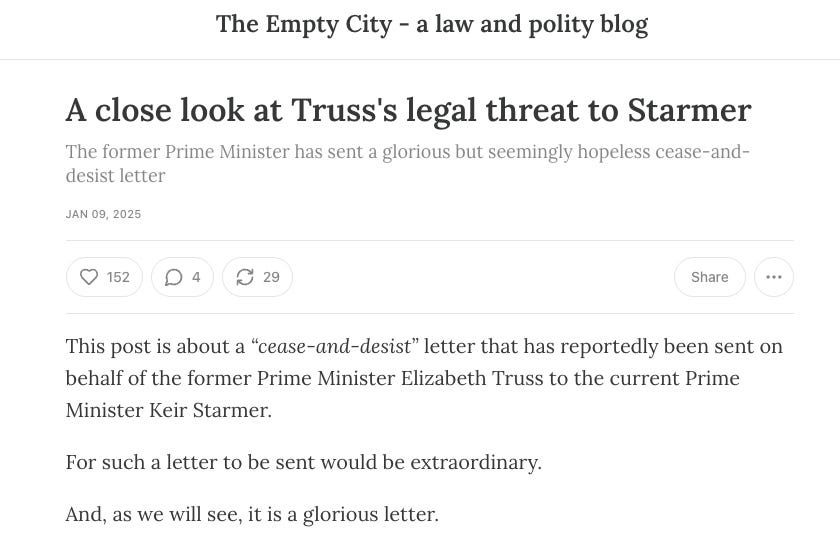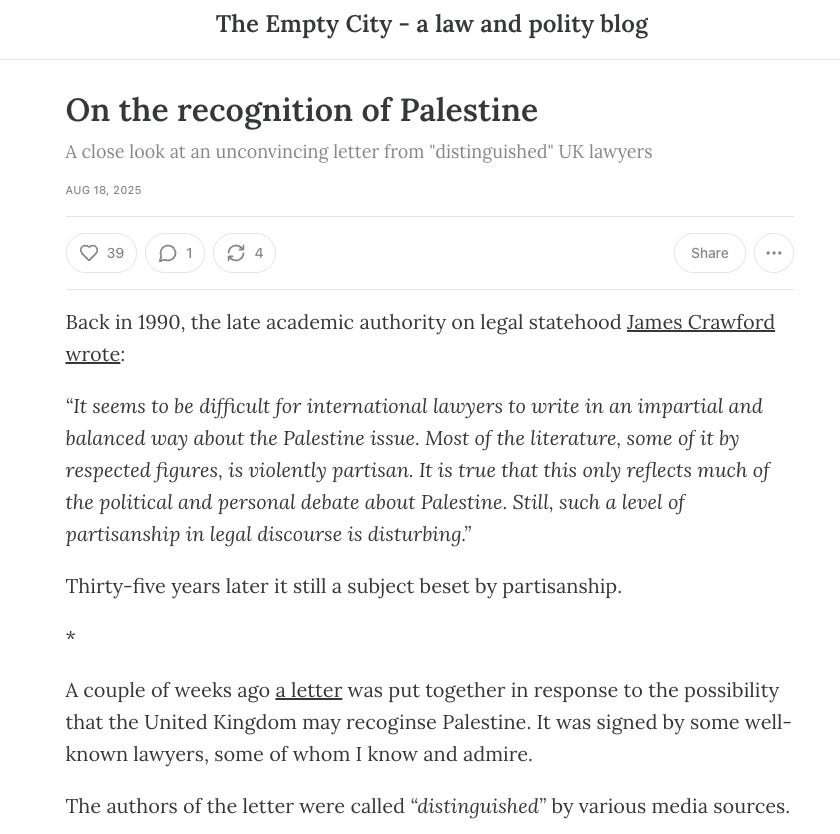Performative Litigation Letters
How certain lawyer letters are intended for news and social media consumption
*
Welcome to the Empty City blog, the name of which is explained here. This blog offers independent and informed commentary and law and policy and is funded by subscribers.
Posts like these take time and opportunity cost - and this blog (currently) is free-to-view and does not have advertising. So if you do genuinely value independent and informed law and policy commentary (rather than AI slop, client journalism, or litigation PR) please become a paying subscriber.
*
From time to time one comes across lawyer letters - and advices - that are published by the news media and circulated on social media.
On the face of it, these seem like normal lawyer letters and advices. There is sometimes a letterhead with the name of a law firm, or they are signed by some barrister with their chambers address, or by a group of “distinguished” lawyers. There are formalities and legalistic language. There are even sometimes little gimmicks and legal paraphernalia, like the “PLEASE GOVERN YOURSELF ACCORDINGLY” beloved of certain United States attorneys.
But the effect, if not the intention, of such documents is to have the attention of news media and social media.
The impression the documents convey is that their primary if not sole purpose is publicity.
As such they can be little more than press releases in a lawyery guise.
*
Earlier this year in January, the former prime minister Elizabeth Truss instructed a lawyer to send such a letter to the current prime minister Keir Starmer.
This blog set out how, from a legal perspective, the letter was gloriously hopeless:
(And until this week, that was the most popular post this blog has ever published, but she has now been, well, trumped.)
Truss’s legal threat, of course, went nowhere in any legal sense. But it got media coverage during a slow news month. And of course, that was the presumed intention.
The absurdity of a free speech absolutist sending such a letter had some bemused discussion. And then the letter was pretty much forgotten about.
That a former prime minister was threatening the current prime minister with an expensive libel claim seeking coercive remedies over whether the former crashed the economy - a matter of plain public interest - just came and went, as a moment of madness.
(Truss later said she was to launch an uncensored free speech social media platform. Uncensored, presumably, other than any posters there saying she crashed the economy.)
*
Then this summer we then had a lawyers’ letter about whether the United Kingdom government could lawfully recognise Palestine. This was not a letterheaded missive like the letters discussed above and below, but it was certainly signed by a lot of lawyers, some quite famous (and some I know and admire).
This blog featured that opinion here:
It is always a warning sign when any news article relies on the lawyers expressing being a view being “distinguished”.
For if a legal opinion is sound, it matters not if the lawyers are “distinguished” - and if the legal opinion is not sound, the lawyers being “distinguished” will not save it.
That is the egalitarian beauty of legal reasoning and analysis.
This letter conveyed an impression that the United Kingdom would breach international law if it recognised Palestine as a state, but the letter was careful not to actually say this.
The letter instead said that it such recognition would be “contrary” to international law, in that it would not be in accordance with certain criteria, a subtle but significant difference. The letter was careful not to allege “breach” - and nor did it provide any legal rule in reespect of which there could be a breach.
Nonetheless various news media reported that “distinguished” lawyers were saying the United Kingdom would be in “breach” of international law:
Such news reports were not corrected.
Again, a legal letter worked as a media device, at least in the short term.
The United Kingdom government, however, ignored such grave concerns from “distinguished” lawyers and recognised the Palestinian state anyway.
*
And this week we have had the pantomime of President Donald Trump’s legal threat against the British Broadcasting Corporation.
(This blog’s post setting out what the BBC should say in return is, in less than a day, the most popular post this blog has ever published.)
It is too early to say whether this threat is entirely performative. Trump is a regular legal bully and knows well how to use legal threats as leverage, and so he may well file a suit against the BBC, as the central facts are not helpful to the BBC and, as this blog has previously commented, the BBC has little or no inherent institutional strength.
In essence: if Trump filed suit, one could expect the BBC to capitulate, regardless of the legal merits of the case.
But there is certainly a performative element to the letter setting out the legal threat.
The letter is weak: it does not provide any evidence to support its three assertions of “overwhelming financial and reputational harm”.
It also does not show that the programme was viewed in the United States or how it had any adverse effect on Trump given he was re-elected as president days after it was broadcast on the United Kingdom.
But much of the news coverage of the letter took its threat at face value. Very few news outlets have critically engaged with the content of the letter.
And again that is the presumed intention: the BBC has been put on the defensive and Trump looks like he will extract some public recantation from the BBC.
From a political and media perspective, the letter has worked, regardless of its weak content.
*
But the proper purpose of any lawyer letter is not as a publicity device.
Legal correspondence has an important function between parties (and also often when placed before a court), and the correspondence should set out the reasoned and evidenced legal positions of those instructing the lawyers.
Legal letters should be instruments, not ornaments.
The same can be said for legal opinions and advices, which should be for the consumption of the client to whom they are addressed.
There are serious questions about whether such correspondence and advices should also be used for collateral, media purposes, as a form of public relations.
For such documents convey legal seriousness when, in fact they are often garnished press releases. As such they can lead to misleading news reports.
Their use for media items should, in principle, be discouraged.
That said, this blog would miss these missives if they go.
For one way of promoting the public understanding of law is to use such documentation as the basis of explanatory blogposts.
Such posts seem to be by far the most popular things a legal blogger can write about, and so I have a selfish interest in their continued use - and misuse.
And so, one supposes, we should all just govern ourselves accordingly.
**






I have a feeling that these performative letters are an import from the US and are becoming increasingly common. I consider that some of the more egregious examples should be investigated by the SRA.
Thank you for your serious yet whimsical opinion on these matters. As always, this post is a delight to read.